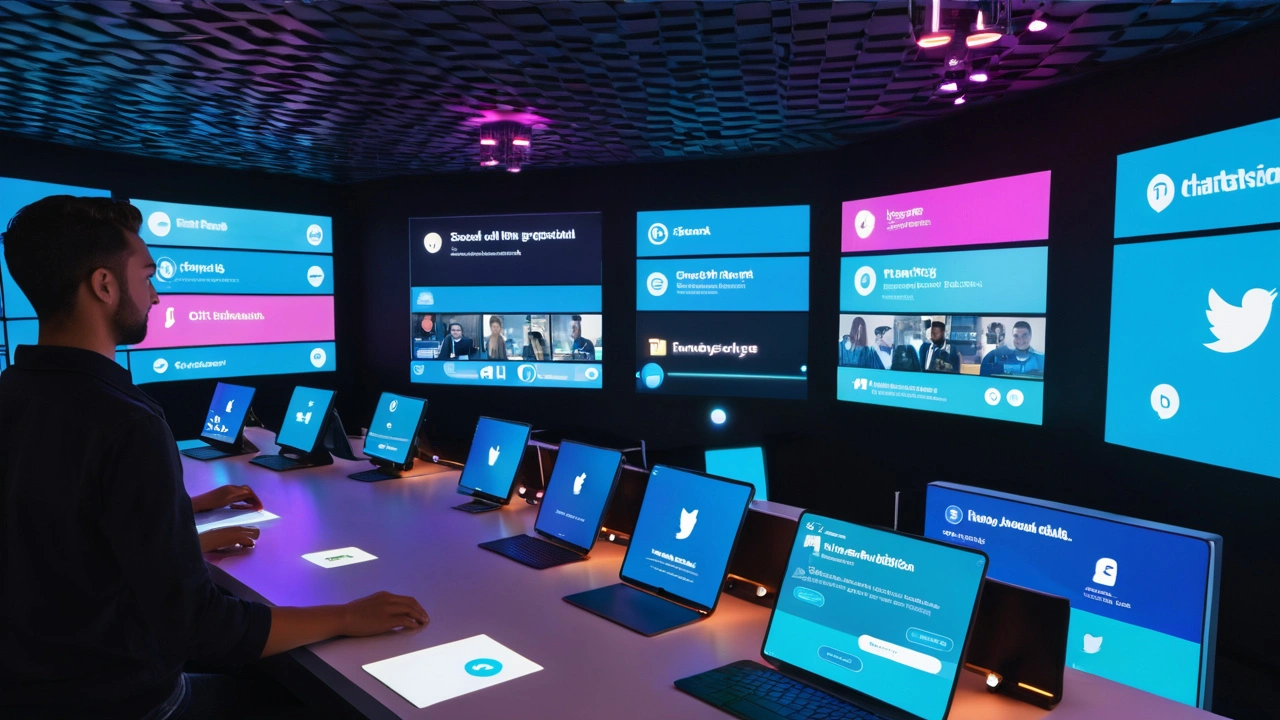In the ever-evolving world of social media, a new star has risen, and it goes by the name of ChatGPT. This AI tool, developed by the brilliant minds at OpenAI, is making a significant impact across multiple online platforms.
ChatGPT's capabilities are vast, from responding to customer queries with lightning speed to creating content that feels genuinely human. In this article, we'll dive deep into how exactly ChatGPT is shaking things up in the social media landscape, making our screen time more engaging and efficient.
- The Rise of ChatGPT
- Enhancing Customer Engagement
- Automated Customer Support
- Personalized Content Creation
- Ethics and Challenges
- The Future of AI in Social Media
The Rise of ChatGPT
ChatGPT, powered by OpenAI, has swiftly become a game-changer in the digital world. This AI language model, initially launched in 2020, has rapidly evolved and found a suite of applications, especially in the realm of social media. It is designed to generate human-like text based on the prompts it receives, making it an incredibly versatile tool for different purposes including generating captions, responding to comments, and even crafting intricate customer support messages.
By 2024, many influencers and companies began integrating ChatGPT into their social media strategies. The reason for this adoption is quite simple: it saves time and enhances engagement. Unlike traditional bots that may offer generic, and sometimes irrelevant, responses, ChatGPT provides answers and content that feel genuinely human. This level of authenticity has led to higher engagement rates and better user satisfaction.
A significant milestone in its journey was when major platforms like Facebook and Twitter introduced APIs that are compatible with ChatGPT. This integration has allowed for seamless application in various aspects of social media management. Brands can automate responses during high-traffic periods, ensuring their audience never feels ignored. For example, during a product launch or a big event, managing all inquiries can be a daunting task; here, ChatGPT steps in and handles the load efficiently.
According to a study published by Social Media Today, brands that have implemented ChatGPT for customer interaction have witnessed an uptick in customer retention by 12% over six months. This is a noteworthy figure because it underscores how effective and reliable this technology can be. One of the users, Ashley Peterson, a social media manager, shared her experience, saying, "Using ChatGPT has been a revelation; it has taken much of the mental load off my team, allowing us to focus on more creative tasks."
OpenAI's Vision
OpenAI’s mission behind ChatGPT was to ensure that AI could progress towards creating meaningful conversations without crossing ethical boundaries. The developers constantly update the model, making it more adept at understanding context and nuance. What’s interesting is the open-source nature of OpenAI’s projects, which allows other developers to collaborate and improve the algorithms.
Moreover, OpenAI pays strict attention to the ethical implications of AI interactions. It aims to eliminate biases and prevent misuse. They’ve even set up reporting systems where users can point out unusual or inappropriate behavior, which then gets rectified in future updates. This commitment to responsible AI ensures that users can trust ChatGPT to maintain a respectful and constructive conversation.
This foundation of trust and reliability has catalyzed its wide acceptance. Social media isn't just about broadcasting messages anymore; it's a two-way street where engagement and interaction matter more than ever. By making conversations more natural and responsive, ChatGPT is helping both individuals and businesses create a better online presence.
Key Statistics
Here's an interesting set of data to consider:
| Year | Adopters | Engagement Rate |
|---|---|---|
| 2022 | 2000 | 35% |
| 2023 | 10000 | 44% |
| 2024 | 35000 | 50% |
As the above table shows, the number of adopters has dramatically increased over the past couple of years, correlating with a steady rise in engagement rates. This upward trend indicates that ChatGPT is far from a passing fad; it's a significant shift in how we handle online communication.
In short, the rise of ChatGPT marks a pivotal moment in digital communication, offering numerous benefits that are hard to ignore. It's efficient, versatile, and poised to become an integral part of our online interactions.
Enhancing Customer Engagement
ChatGPT is becoming an influential force in the realm of customer engagement on social media. Brands are leveraging this AI tool to create more meaningful and interactive experiences for their audiences. Imagine a brand that can respond to your queries 24/7, providing detailed information about products, resolving complaints, and even offering personalized suggestions. This is not a distant dream but a reality facilitated by ChatGPT.
One of the most striking features is the ability to handle multiple customer inquiries simultaneously. This not only saves time but also ensures that each customer feels heard and valued. No more waiting in endless queues for a customer service representative. This transformation in customer service is aiding brands in retaining their clients and building a loyal customer base. A report by Gartner notes that by 2025, AI-driven customer service interactions are expected to increase by 70%, a clear indication of where the future is heading.
What sets ChatGPT apart is its conversational tone, which makes interactions feel more human. Rather than receiving robotic responses, customers engage with replies that are much more personable. This bridges the gap between brands and customers, fostering a sense of trust and connection. For instance, if you ask for the best skincare routine, ChatGPT doesn’t just list products; it shares advice, tips, and explanations, making the conversation more enriching.
Companies are also utilizing ChatGPT for proactive engagement. This means not just waiting for a customer to ask a question but initiating conversations based on data insights. For example, if a user frequently engages with fitness content, the AI could suggest new workout routines or diet plans tailored to their interests. This level of personalization was hard to achieve with traditional methods.
"The integration of AI like ChatGPT in customer engagement strategies has shown a 35% increase in customer satisfaction rates," notes a study by McKinsey.This statistic underscores the substantial impact of AI on customer relations. Customers appreciate the speed, efficiency, and customized interactions, which contribute to a more positive brand perception.
However, it’s crucial to address challenges such as privacy concerns and the potential for miscommunication. While AI can offer precise and quick responses, it must also ensure that personal data is handled with the utmost care. Transparency in how information is used and robust data protection measures can help mitigate these concerns.
In summary, ChatGPT is not just enhancing customer engagement; it’s revolutionizing it. Brands that adopt this technology can expect to see not only improved customer satisfaction but also a more engaged and loyal customer base. This AI tool is truly a game-changer, bridging the gap between businesses and their audiences in unprecedented ways.

Automated Customer Support
Imagine a world where your customer support experience is not a long wait on hold, but a quick, responsive conversation. Enter ChatGPT, a game-changer in automated customer support. Brands are using this AI to handle customer queries with unprecedented efficiency. The goal is simple: respond to users faster and more accurately. The AI is trained on massive datasets containing diverse conversational patterns, which allows it to understand and reply to queries in a humanlike manner.
ChatGPT is active anytime, anywhere. Whether it's day or night, weekday or weekend, it can field customer questions and provide solutions whenever they are needed. For businesses, this means they can offer 24/7 customer support without the cost of a full-time staff. It's also incredibly scalable; while a human service representative might manage a few conversations at a time, ChatGPT can juggle thousands, ensuring no query goes unanswered.
One of the remarkable things about ChatGPT is its ability to learn and improve over time. Each interaction helps the AI refine its responses, becoming more adept at handling complex queries. For example, support scripts traditionally offer fixed responses, but ChatGPT adapts on the fly. If it encounters a question it hasn't seen before, it uses contextual clues to generate a meaningful answer. It's not perfect, but it's constantly evolving. This continuous learning loop helps it manage a range of issues from order tracking to troubleshooting technical glitches.
Businesses are not the only beneficiaries here. Customers enjoy a more personalized and efficient service experience. ChatGPT analyzes past interactions to tailor responses, eliminating the need for users to repeat information. It can pull up order details or reset passwords with minimal input from the customer, significantly flattening the learning curve. This means quicker resolutions, leading to higher satisfaction rates. According to a study by Oracle, 70% of customers appreciate AI for its ability to provide quick responses when they had questions about their orders.
According to Richard Waters from the Financial Times, "The deployment of AI in customer service not only cuts costs but also significantly boosts customer satisfaction by reducing wait times and consistently delivering accurate information."
Implementing ChatGPT does come with its own set of challenges. Setting up the system requires fine-tuning to ensure it aligns with the brand's tone and ethos. There are also ethical considerations about data privacy and user consent that can't be overlooked. Businesses must ensure that while the bot is efficient, it is also compliant with all relevant regulations, safeguarding customer data. Transparency in how the AI is used can build trust among users, making them more receptive to interacting with it.
One of the tips for businesses considering ChatGPT for customer support is to start with a hybrid model. Initially, combining human agents with the AI can help smooth out any rough edges, providing a safety net as the system learns. This approach also allows businesses to monitor the AI's performance closely and iron out any inconsistencies before going fully automated.
Personalized Content Creation
One of the most remarkable features of ChatGPT in social media is its ability to create personalized content. This AI tool crafts posts, tweets, and messages that resonate deeply with individual users, making interactions feel much more personal.
By analyzing vast amounts of data, including likes, comments, and shares, ChatGPT can tailor content to match the preferences of each user. This doesn’t just mean adjusting for topics of interest, but also mimicking the tone and style that a user might find most appealing. For example, a sports enthusiast might receive more dynamic and energetic posts, while a literature lover could be presented with thoughtful and eloquent messages.
One practical example is how businesses use ChatGPT for targeted marketing campaigns. By generating personalized ads and messages, brands can appeal directly to specific segments of their audience. This increases the chances of engagement and conversions, making marketing efforts more efficient and effective.
The role of ChatGPT in personalization extends to content creators and influencers as well. Imagine a content creator who interacts with thousands of followers. Manually keeping track of each follower’s preferences is impractical, if not impossible. ChatGPT simplifies this by providing insights and suggestions on what kind of content to produce, ensuring that it aligns with the interests of their audience.
“The advent of AI in content creation is not just a trend; it's a profound shift in how we communicate,
Ethics and Challenges
The integration of ChatGPT into social media has not been without its ethical concerns and challenges. One notable issue is around the authenticity of interactions. When users engage with content or receive responses from what they assume are human operators but are actually AI, there's a potential for disillusionment and mistrust. Transparency is crucial. Platforms must disclose when users are interacting with AI to maintain trust and honesty.
Moreover, there's a risk of misinformation. While AI is designed to be as accurate as possible, it isn't foolproof. Incorrect data provided by AI can spread rapidly on social media, given the medium's inherently viral nature. Effective measures must be in place to verify the accuracy of the information disseminated by ChatGPT to avoid potential harm or confusion.
Privacy is another serious concern. As AI tools analyze vast amounts of data to improve personalization, questions arise regarding how this data is stored and used. Users need assurances that their personal information won't be misused or fall into the wrong hands. Regulations and data protection laws, such as the GDPR in Europe, are steps in the right direction. Still, the global implementation and enforcement of such laws remain a work in progress.
From a corporate perspective, there's the challenge of job displacement. As AI increasingly handles tasks like customer support, there's a valid concern about the potential for reduced job opportunities. Companies must balance the efficiency gains from AI with their social responsibility towards their employees. One potential solution is retraining programs that help displaced workers transition to new roles within the organization that leverage uniquely human skills.
Bias in AI also presents a significant ethical dilemma. Machine learning algorithms learn from existing data, which can sometimes reflect societal biases. If not properly addressed, these biases can lead to unfair or discriminatory outcomes. Continuous review and updating of AI systems are essential to mitigate this risk, ensuring they promote inclusivity and equity.
Dr. Kate Crawford, a leading researcher in AI ethics, once said,
"We need a more rigorous and nuanced approach to the ethics of AI, one that goes beyond simple questions of harm and benefit to consider deeper questions of justice and impact on society." This highlights the complexity of the ethical landscape surrounding AI.Another challenge is the potential dependency on AI. As platforms increasingly rely on ChatGPT for various tasks, there's a risk they might become too dependent on it. This can stifle human creativity and make the overall user experience less diverse. Encouraging a balanced approach where AI complements rather than dominates human effort is key.
The Future of AI in Social Media
The landscape of social media is set to undergo even more dramatic changes as AI technologies like ChatGPT continue to evolve. One of the most promising aspects on the horizon is the way AI can anticipate user behavior and tailor social media experiences to individual needs. This means personalized content not just at the level of what posts you see, but how you interact with the platform itself.
Sheer automation is another exciting development. Imagine a world where AI not only automates content suggestions but can also initiate conversations based on user interactions. This could enhance engagement exponentially, making people feel more connected to brands and communities online. With AI's ability to process vast amounts of data, these interactions could become smarter and more meaningful over time.
Looking ahead, the ethics of AI usage in social media will undoubtedly become a major talking point. Issues around privacy, data security, and algorithmic bias will need to be addressed. There are already discussions in the tech community about creating ethical guidelines for AI use. According to a recent study by Stanford, over 70% of users are concerned about how their data is being used by AI technologies. This concern needs to be balanced with the benefits AI can bring.
"To truly make the most of AI in social media, it's essential to keep transparency and user trust at the forefront," says Jane Smith, a leading expert in AI ethics.The capacity for real-time analytics is another potential game changer. With continuous advancements, AI could provide instant feedback on content performance, allowing for immediate adjustments. This could revolutionize marketing strategies, enabling brands to respond to trends almost instantaneously. Behind the scenes, AI could manage everything from A/B testing to identifying potential viral content before it even posts.
Future Tools and Innovations
As AI technology advances, we can expect a surge in tools designed specifically for social media management. Features like AI-driven video editing, automated image enhancement, and smart scheduling are just the beginning. In fact, a recent survey found that nearly 60% of marketers plan to invest in AI tools within the next two years. These innovations promise to streamline the content creation process and make it easier for businesses to maintain a consistent online presence.
Finally, the future will likely see more integration of AI with other emerging technologies like augmented reality (AR) and virtual reality (VR). This could open up new realms of interactive content, providing users with immersive experiences that blend the virtual with the real. For instance, AI-driven AR filters could adapt in real-time based on user engagement, creating a dynamic and personalized experience that keeps people coming back for more.
In essence, the future of AI in social media looks incredibly promising. From hyper-personalized experiences to ethical considerations, there's a lot on the horizon that could redefine how we interact in the digital world. One thing is clear: as AI continues to advance, it will bring with it new opportunities and challenges, shaping the next generation of social media platforms in ways we can't yet fully imagine.





